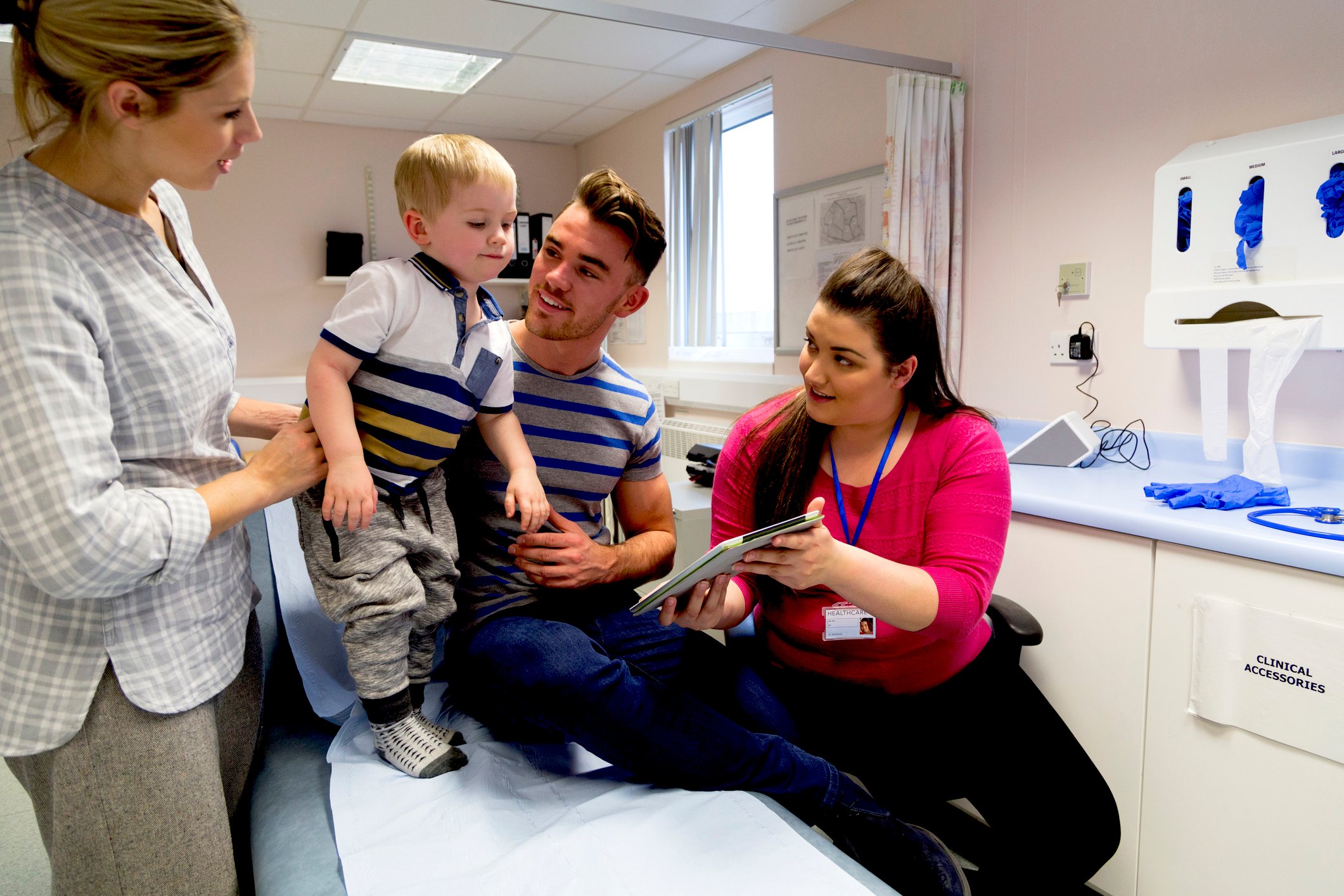As a nurse who is passionate about the healthcare system and who is dedicated to providing the best possible patient care, you are exactly the kind of person who would benefit from pursuing a doctorate degree in nursing.
Ultimately, your long-term career goals will determine the best nursing degree for you, but we’re here to tell you about one nursing program that offers room for growth, flexibility, and opportunity for leadership and autonomy — the Doctor of Nursing Practice (DNP) degree with a Family Nurse Practitioner (FNP) specialization. Sacred Heart University’s College of Nursing has an FNP-DNP program that is best suited for those looking to enhance their career with more authority in direct patient care and who are seeking the opportunity to work with varied populations in different settings.
If you’re considering becoming a Family Nurse Practitioner, you should ask a variety of specific questions — important questions that will help you to choose the right FNP-DNP program. Here are several questions we think are crucial for aspiring family nurse practitioners to ask when considering graduate school.
Doctor of Nursing Practice degree with a Family Nurse Practitioner specialization.
As we face a shortage of physicians, expert Family Nurse Practitioners (FNP) are becoming more and more valued and sought after in the field of nursing. But the question becomes: What is the best path to achieving FNP certification? Let’s explore the options that aspiring FNPs have, namely choosing a DNP with an FNP specialization over an MSN (Master of Science in Nursing).
1. Why should I get a DNP instead of an MSN?
The Master of Science in Nursing (MSN) is a respected degree, but if you are looking for more autonomy in your career, you should consider an FNP-DNP degree versus the MSN. As the highest credential a student can achieve in nursing, the DNP degree offers students much more clinical experience than an MSN and prepares nursing leaders to impact change in both direct patient care and at a policy level.
Further, while an FNP should at the very least have an MSN, achieving a DNP is becoming the standard for Family Nurse Practitioner professionals across the country. In fact, the American Association of Colleges of Nursing (AACN) says that the MSN degree may not be a viable path to becoming an FNP for much longer: “The DNP provides a clinical option for advanced preparation in nursing practice that is more comparable to other intraprofessional education.”
Also, did you know that Connecticut is one of the 22 states that allows those with an FNP-DNP degree to open their own practice? In other words, if you graduate from SHU with your FNP-DNP, you can practice without the supervision of an MD or DO.
2. Which FNP-DNP program is right for me?
Before making the decision to invest in a graduate degree, be sure to do your due diligence in researching available programs. You will want to research the reputation of the faculty, the class model/structure, opportunities for field training and hands-on experience, applicable program certifications/accreditations, what the certification pass rates are, and the attrition rate of the program. It’s also worthwhile to take the extra step and make sure that the program you’re researching is up to the standards suggested by the American Association of Colleges of Nursing.
According to the American Association of Colleges of Nursing (AACN), there are four indicators of quality in a doctor of nursing practice program: 1) faculty characteristics, 2) faculty and practice, 3) practice resources and clinical environment resources, and 4) academic infrastructure. The DNP-FNP program at Sacred Heart University far surpasses the minimum standards for each of these indicators of quality, providing graduates with a strong educational and experiential foundation for their clinical practice.
3. What is the reputation of the program and faculty?
Asking this question is a must: Like all colleges and universities, nursing programs have reputations that can influence your final decision based on what your priorities are. Do you want a school that is known to be research focused or one that has a heavier focus on clinical practice? Again, your priorities will help you determine the right fit for you.
While you can gain information about the FNP-DNP program on our website, you should definitely seek out professionals who are in or have completed the program. If you have the opportunity to hear from an alum directly, ask questions like: How has your degree enabled you to achieve your career goals? Which areas does the program excel and what needs improvement? What advice would help a prospective student? Answers to these questions will shed light on how the program may or may not meet your needs.
In addition, the expert faculty at SHU are highly-experienced professionals and are recognized as experts among their peers. Most of our faculty are actively engaged in clinical practice while also teaching in the classroom, offering students the best of experience and continued exposure.
4. What is the class model or structure? Online, hybrid, or traditional?
Another factor to consider is whether the class model or structure of a particular program will fit with your lifestyle. Some schools require students to take courses exclusively on campus in a traditional setting, while an increasing number of schools are providing more flexible class opportunities with hybrid or online models. Whether you favor an in-person learning style or work full-time and need to take some classes online, make sure the program has the options you need to complete your degree.
With flexible learning options, Sacred Heart University allows FNP-DNP students to complete their degree part-time or full-time using a hybrid model so that students can complete courses both online and on-campus.
5. Is the curriculum rich with hands-on experiences and clinical practice?
One key component of an FNP-DNP program is the hands-on, clinical experience. On-the-ground field work is where you get to test your knowledge. You will want to compare programs to determine which ones strike a fair balance between experiential learning and clinical practice. Do the programs offer experience in operating rooms or other clinical situations? Will you spend time in labs applying lessons before going into the field? These are a couple of follow-up questions that can help you determine if the program offers the clinical experience you are looking for.
Furthermore, you will want to confirm with an advisor that the curriculum they offer will fulfill your educational and career goals. Sacred Heart University partners with local professionals to provide students with hands-on experience at local, regional, and national levels – combining classroom lessons with on-the-job experience.
6. How are clinical practice hours integrated into the program?
FNP-DNP students need to complete 1,000 hours of clinical practice for their degree. Different schools have varied ways of integrating practice hours into their FNP-DNP programs: Some schools use the capstone project as the main source of clinical hours while others allow students to gain credit hours through policy summits, leading work teams, simulations/lab environments, etc.
Talking to current or past students and faculty can help you get a feel for the integration of these invaluable hours into your program. If you have a specific area of interest, make sure to check with an advisor to see if hours can be tailored to complement your specialty.
7. How are the capstone projects set up?
Most schools follow one of the two following capstone models:
- Traditional model that requires students to take certain courses prior to beginning their project.
- Integrated model that allows students to begin working on the project at the start of and throughout their degree.
Both options produce successful results, but you will want to determine which method will be best for you. For example, if you are somewhat new to the nursing field, you may feel more comfortable with a program where you take a series of classes before starting your capstone project. Ask faculty about past capstones to get an understanding of the different ways students are able to complete their projects.
8. What are the certification exam pass rates?
If you are going for an FNP-DNP degree, you are likely seeking to achieve national certification and licensure. The degree to which programs prepare their students for certification will be revealed in their certification exam pass rate – make sure to check the program website for these statistics. If they are not listed on the website, make sure to ask an advisor what the pass rate is for first-time exam takers.
9. What are the attrition rates of the program?
While the ideal attrition rate, or percentage of students who drop out of a program before completion, is zero, even the best FNP-DNP programs maintain a low attrition rate, which is not necessarily a reflection of the program. Attrition rates fluctuating between 5 -10 percent are not automatically a cause for alarm; however, attrition rates over 10 percent are definitely worthy of further investigation. Why are so many students dropping out of the program? Is it a reflection of the program itself or is it the result of an unrelated factor with unfortunate consequences?
Asking questions about attrition rate may feel a bit awkward, but it’s important in order to assess the quality of the program you’re about to invest in.
Transform your future with an FNP at Sacred Heart University!
Making a decision as important as choosing a doctorate degree in nursing can be an overwhelming process, but if you are following your passion by advancing your skills and knowledge with a DNP degree, there is no doubt you will find the success you seek. By taking the time to research your program of interest in depth, you can be sure that your final choice will result in significant return on investment.
Sacred Heart University takes great pride in preparing mission-driven, results-oriented changemakers who can thrive in the field of nursing, and we’d love to help you jumpstart your career as a true nursing leader. Contact us to learn more or start your online application today!









![[Student Q&A] Why I Pursued a DNP at Sacred Heart University](https://info.sacredheart.edu/hubfs/20180213_CHE_Pediatrics_Lab%20127-sm.jpg)